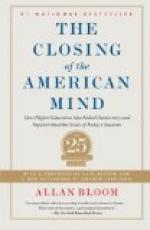Nevertheless, we have gone far enough to recognize that all our thinking will be transformed under the influence of the struggle. It will be impossible for us, after the War, to do what we have done so widely hitherto: proclaim one range of ethical ideals and standards, and live to something widely different in practice. Either we shall have to abandon the standards, or bring our conduct measurably into harmony with them. We shall be unable longer to hold unconsciously in solution Christianity and the gospel of brute force. One or the other must be rejected, or both consciously reconstructed. The effect on the thought life of the world will be even greater—vastly greater—than that of the French Revolution. The twentieth century will differ from the nineteenth more than that did from the eighteenth. The effect on the relations of different social groups throughout the world will be so far-reaching that possibly the democracy and socialism of the nineteenth century may look like remote historic phenomena, such as the Athenian tribal system or mediaeval feudalism.
Thus our whole social philosophy will have to be remolded. We Americans are still in the patent medicine period of politics, trusting to political devices on the surface for the cure of any evils that arise. All across the country, like an epidemic of disease has gone the notion —if anything is the matter with us, just pass another law. Thus we are suffering under an ill-considered mass of legislation, while blindly trusting to it to solve all problems. Legislation is no solution for moral evils. It is possible, to some extent, to suppress vice by legislation, but not to create virtue. Virtue can be developed only by conduct and education. You cannot drive men into the kingdom of heaven with the whip of legislation; and if you could, you would so change the atmosphere of the place that one would prefer to take the other road.
If our democracy is to survive, we must think it through; carrying it down, from these superficial political devices, into our industry and commerce, still so largely dominated by feudal ideas of the middle age, into our science and art, far more completely into our education, into our social relationship, and beyond all else, into our fundamental attitude of mind. Democracy is, at bottom, not a series of political forms, but a way of life.
Thus the War will be the supreme test of democracy. The question it will settle is this: can free men, by voluntary cooperation, develop an efficiency and an endurance which will make it possible for them to stand and protect their liberties against the machinery and aggressive ambitions of autocratic empires where everything is done paternally from the top? If they can, then democracy will survive and grow as the highest form of society for ages to come; if not, then democracy will pass and be succeeded by some other social order.




